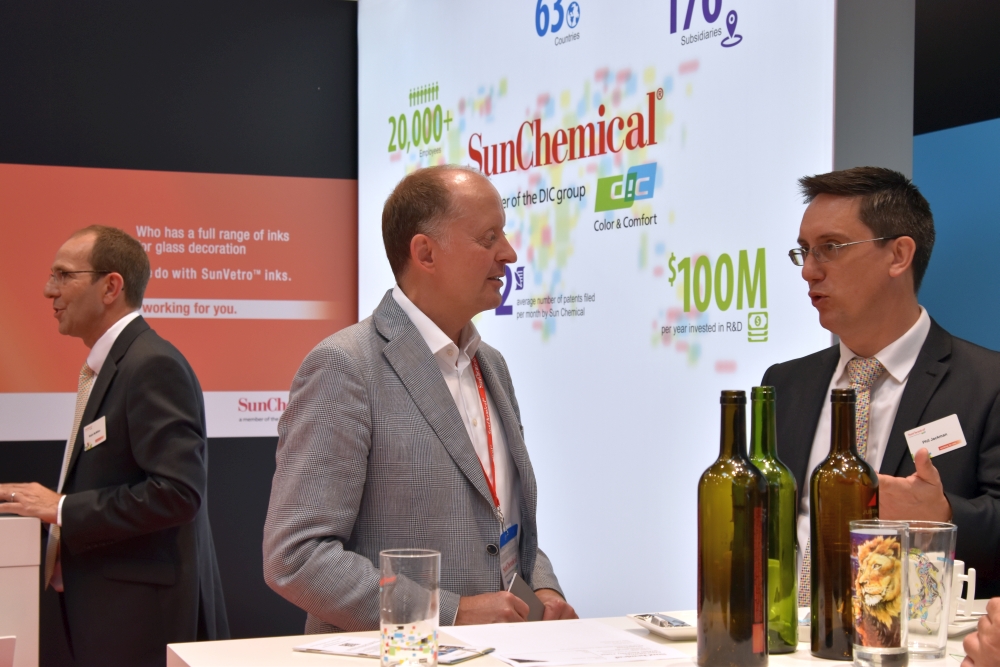The pavilion of ESMA, the European Specialist Printing Manufacturers Association, is the place-to-be for all interested in the latest solutions for glass decoration at glasstec, 23-26 October 2018at Messe Düsseldorf. ESMA members present screen, digital and pad technologies for flat and hollow objects, in applications ranging from packaging, through to architectural, automotive and appliance glass. Surrounded by printing systems, vision inspection devices, coatings, inks and other consumables, the visitors to ESMA booth in hall 12 D45 can also take advantage of expert advice. Free vouchers for the exhibition are offered by the GlassPrint conference co-organised by ESMA and “Glass Worldwide” in 2019.
“Since the last fair edition in 2016, there seems to be a clear revival of the glass industry and this was confirmed last year during our successful GlassPrint conference”, says Peter Buttiens, CEO of ESMA. “Printing on glass is much more than the traditional decorative processes. On one hand, special effects are pushing new limits, and at the same time, solutions for technical glass are in high demand, offering a combination of different functional printing technologies for applications in smartphones, touch panels or wearables.”
ESMA organises its pavilion for the fifth time and the three islands in hall 12 will featurthe custom-moldede following member companies:
Ammann (booth D47) is a producer and developer of ceramic transfers for and with customers in the flat glass industry. These transfers have functional and decorative features and are fired on the flat glass during the tempering process. Large format prints as well as different application methods for a broad range of firing temperatures, combined with in-house colour manufacturing, guarantee a wide range of applications for the customers.
Fimor (D49), a world leader in polyurethane squeegees, displays its Serilor® line of products for most screen printing applications including window protection, anti-reflective (varnish) and details. Fimor demonstrates also custom-moulded polyurethane technical parts used in the handling and protection of glass products.
Gallus (E46) presents its Screeny C-Line with an innovative and highly refined screen printing plate for hollow glass. The plate is mounted on a two-sided quick-action self-tension frame in combination with the new Phoenix CtS machine from Heidelberg and the automatic development device Screeny 400 Eco.
Kissel+Wolf (D50) focuses on KIWOMASK IJ 7312/2 VP: an inkjet compatible sputter resist for decorative sputter coating of architectural glass. The resist is applied to the surface to be coated using a flatbed digital printer for solvent inks. In addition to their portfolio of resists and coatings, KIWO focuses also on special adhesives and screen-making chemicals.
RUCO (D46) showcases its comprehensive expertise in glass and ceramics decoration. The company’s special focus lies on its innovative screen printing ink series 937LED which is suitable for curing both by means of LED technology and conventional mercury- or iron-charged standard UV lamps. Presented for the first time about a year ago, these inks are becoming increasingly popular with customers concerned with the decoration of hollow and flat glass.
Saati (E50), a world-class supplier of the screen making products for over 80 years, develops and manufactures fabrics, chemicals and equipment in complete screen printing packages. In the automotive, architectural and appliance glass industries, specially developed Saatilene Hi-Glass fabrics and SAATIvit & Vitrum emulsions enable the strictest printing tolerances.
Sefar (C49) presents screen printing meshes with high reproducibility and quality, to facilitate and accelerate the production of stencils and optimise the printing process – precisely tailored to the demanding market expectations.
SPS Technoscreen (D41) showcases the high precision ATMA PP50 machine in operation. This small-size, camera-controlled flatbed printer reaches print accuracy of ˂30μm and is used for glass cover lenses for smartphones and tablets. On-going video demo on fully automatic screen-printed glass decoration for appliance, architectural and automotive glass will be shown.
Sun Chemical (D43) presents the latest offerings from its SunVetro range of glass decoration solutions including organic inks, spray coatings, glass preparation products and cold end coating solutions. Visitors to their stand see how these solutions can be applied to a wide variety of glass packaging to significantly enhance product branding, aesthetic impact and functionality.
Tichawa Vision (D37) presents its VDCIS Industrial Scanner, a high-precision CIS (Contact Image Sensor) intended for industrial quality control. The CIS system is designed for the surface inspection of food products and blister packaging as well as products made of glass, wood, metal, plastics and ceramics.
Tiflex (D35) shows a breakthrough in UV ink technology and announces the launch of the new UVIPRIM GL DIAMOND ink series for glass decoration. Implementation of this new UV ink can generate 15% increased productivity.
Additionally, ESMA pavilion will be joined by Proell (C45), an ink company that develops custom-made printing solutions for glass, metals and plastics. NoriGlass TPI and NoriGlass OR (outdoor resistant) are highly resistant two-component glass screen printing inks for the decoration of touch panels. Tampo-Jet GMI is a two-component pad printing ink for printing on glass flacons.
Although many of the above specialise predominantly in screen technologies, everyone interested in the advancements of digital inkjet printing can step by the ESMA booth (D45) to talk to experts from this domain and gain updates on the upcoming educational events: The Inkjet Conference (16-17 October 2018, Düsseldorf), ESMA Academy in Industrial Digital Print (5-8 November 2018, Stuttgart) and the Advanced Functional & Industrial Printing Conference (27-28 March 2019, Düsseldorf).
